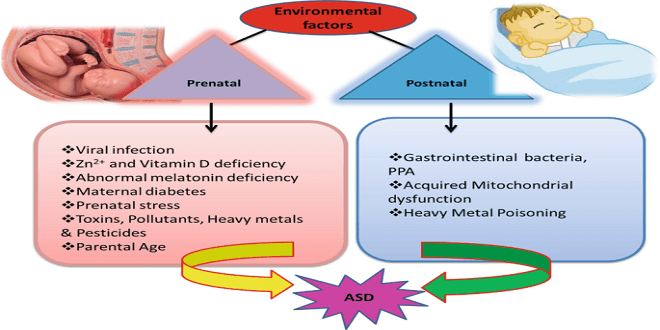Autism spectrum disorder (ASD) is a neurodevelopmental condition that is distinguished by enduring challenges in social communication and interaction, alongside the presence of limited and repetitive activities. Autism’s incidence rate has been steadily rising, and recent estimates suggest that nearly one in every 54 children in the United States suffers from the disorder. Although great progress has been made in understanding autism, the disorder’s etiology is still difficult to pin down and likely involves more than one component. Researchers have investigated a wide range of genetic, environmental, and epigenetic variables that may play a role in the onset of autism. One of these debatable subjects is the possible association between the consumption of acetaminophen during pregnancy and an elevated risk of autism in the offspring of the mother.
The Genetic Aspect Of Autism
Numerous studies have shown that the risk of autism is significantly higher in individuals with affected family members. Identical twin studies have demonstrated a higher concordance rate for autism, indicating a strong genetic influence. Several candidate genes associated with autism have been identified, such as the SHANK3, CNTNAP2, and MECP2 genes, among others. These genes are involved in synaptic function, neuronal connectivity, and transcriptional regulation, all of which are crucial for normal brain development.
Moreover, genomic studies have highlighted the contribution of rare de novo mutations, copy number variations (CNVs), and single-nucleotide polymorphisms (SNPs) in the pathogenesis of autism. CNVs, which are large-scale genetic alterations that involve duplications or deletions of DNA segments, have been particularly implicated in autism susceptibility. Although the genetics of autism are complex and heterogeneous, it is clear that genetic factors alone do not fully explain the observed rise in autism prevalence.
The Role Of Environmental Factors
Beyond genetics, environmental factors have also been implicated in the development of autism. Maternal exposure to certain environmental agents during pregnancy has been the subject of intense research. Various factors, such as maternal infections, prenatal stress, air pollution, and exposure to certain medications, have been proposed to influence the risk of autism in offspring.
One widely debated environmental factor is the use of acetaminophen during pregnancy. Acetaminophen, which is also called paracetamol, is a pain reliever and heat reducer that you can buy over the counter. It is considered safe when used as directed, but some studies have raised concerns about its potential effects on fetal brain development.
Acetaminophen And Autism: Controversial Studies
Several studies have looked into the possible link between a mother taking acetaminophen while she is pregnant and her child having a higher chance of autism. One of the early studies, published in JAMA Pediatrics in 2014, reported an association between prenatal acetaminophen exposure and an elevated risk of autism spectrum symptoms in boys but not in girls. This study raised alarm and sparked further research into the topic.
However, it is essential to note that the evidence on this association is not consistent. A subsequent study published in JAMA in 2016 found no significant association between prenatal acetaminophen exposure and autism spectrum symptoms in either boys or girls. Similarly, a study published in 2017 in the International Journal of Epidemiology did not detect a significant link between maternal acetaminophen use and autism in offspring.
The discrepancies between these studies highlight the complexity of the issue and the need for further research to establish a concrete relationship, if any, between acetaminophen use during pregnancy and autism risk.
Potential Mechanisms Of Acetaminophen’s Effects
If there is indeed a link between maternal acetaminophen use and autism risk, the exact biological mechanisms underlying this association remain unclear. Researchers have proposed several hypotheses to explain how acetaminophen exposure during pregnancy might affect fetal brain development.
Hormonal Disruption: Acetaminophen has been suggested to interfere with the endocrine system, leading to alterations in hormone levels during crucial periods of brain development. Hormones play a vital role in brain organization and may contribute to the pathogenesis of neurodevelopmental disorders like autism.
Oxidative Stress: In response to the oxidative stress produced by acetaminophen, the body produces reactive oxygen species (ROS). Excessive ROS can damage cellular components and disrupt normal cellular processes, potentially affecting fetal brain development.
Epigenetic Modifications: Epigenetic changes involve alterations in gene expression without altering the DNA sequence itself. Acetaminophen exposure might induce epigenetic modifications, leading to long-term changes in gene expression that could influence brain development.
Glutathione Depletion: Acetaminophen can deplete glutathione, a vital antioxidant that protects cells from oxidative damage. Reduced glutathione levels may render the developing brain more vulnerable to oxidative stress and neurodevelopmental abnormalities.
Despite these theoretical mechanisms, it is essential to emphasize that the evidence for a causal link between acetaminophen use during pregnancy and autism remains inconclusive.
Cautions And Limitations Of Studies
Several limitations and cautions should be considered when interpreting the findings of studies investigating the potential acetaminophen-autism association:
Observational Nature Of Studies: Most studies on this topic are observational, meaning they establish associations but not causation. Other factors, known as confounders, may contribute to the observed associations.
Recall Bias: Many studies rely on maternal self-reporting of acetaminophen use, which may be subject to recall bias, potentially leading to inaccuracies in the data.
Biological Plausibility: While some mechanisms are proposed, none have been definitively proven to establish a causal relationship between acetaminophen use and autism.
Dose And Timing: The effects, if any, of acetaminophen on fetal brain development may be influenced by the dose and timing of exposure. Existing studies may not adequately capture these nuances.
Conclusion
Autism Spectrum Disorder is a complex and multifactorial neurodevelopmental disorder with both genetic and environmental influences. While significant progress has been made in understanding the genetic basis of autism, environmental factors continue to be a subject of research and debate.
For more information on the multifactorial origins of autism and the latest research on the potential link between maternal acetaminophen use during pregnancy and autism risk, visit ActionMatters.org.
The potential link between parental acetaminophen usage during pregnancy and an increased incidence of autism in kids is a hotly debated and evolving issue. Although some studies have suggested an association, the evidence remains inconclusive, and the biological mechanisms, if any, have not been definitively established.
As the scientific community continues its investigation of autism’s multifaceted causes, it is crucial to approach such associations with caution and ensure that further research is conducted with robust methodologies and large sample sizes. Understanding the complex nature of autism and its multifactorial origins will ultimately lead to more effective prevention strategies, earlier interventions, and improved support for individuals and families affected by this condition.
 Naa Songs
Naa Songs




